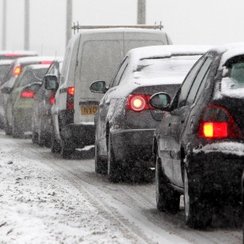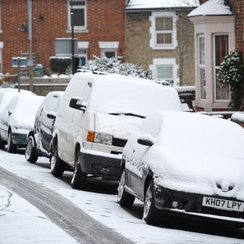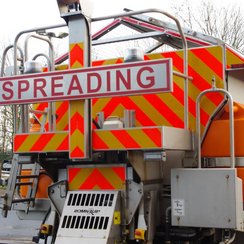On Air Now
Early Breakfast with Lindsey Russell 4am - 6:30am
7 November 2013, 06:00 | Updated: 7 November 2013, 06:55
The Highways Agency is urging drivers across Cambridgeshire to "Make Time for Winter" by preparing themselves and their vehicles to help keep the roads running smoothly.
The latest research from the Agency shows that around half of drivers do not check their vehicles or carry de-icer with them when they travel in severe weather.
Roads Minister Robert Goodwill says: "The Highways Agency does all it can to keep the roads open during severe weather. But drivers need to play their part too by making simple vehicle checks, carrying a few important items and planning their journeys according to the weather. In very severe weather, drivers need to consider whether their journey is really necessary."
However, the Highways Agency's research shows that 56 per cent of drivers in the east do not make any vehicle checks and 24 per cent do not take any of the items in the suggested emergency kit. Thirty per cent do not even carry de-icer.

Highways Agency Traffic Management Director, Simon Sheldon-Wilson, says:
"The Highways Agency is well-prepared for ice and snow. We have over 500 salt spreading vehicles, ploughs and snow blowers, and 270,000 tonnes of salt already in stock.
"Using detailed weather forecasts, we treat the road network before road temperatures fall below freezing, often at night in preparation for peak traffic periods.
"But that doesn't mean people should drive as they normally would, they still need to take care, as they would during any kind of adverse weather, and plan ahead."
The Highways Agency provides real-time traffic information for the motorways and other strategic roads in England using a range of channels, including the web, social media and through national and local radio stations.
The Agency encourages drivers to take some simple steps during winter:
For more advice on being ready for severe weather, click here.

Cambridgeshire County Council are also getting ready for winter, and have carried out a final test of the gritting fleet to ensure the equipment and drivers are in top gear and ready to go when winter comes.
The dry run was designed to check that the 38 gritting trucks are ready for the task ahead with no faults which could have developed during their summer break and the team of 80 drivers are familiar with the treatment routes.
The run, which did not involve spreading any of the stockpiled grit, went well, and the machinery and man-power are now on standby for when the temperatures start to drop and winter weather arrives.
County Council Cabinet Member for Growth and Planning, Councillor Ian Bates, joined the run.
Cllr Bates, who is also a community gritting volunteer, said: "This dry run was the final test of men and machines to ensure we have done everything we can to prepare for the bad weather and I'm delighted to say that both passed the test with flying colours."

The council has more than 10,000 tonnes of salt stockpiled across the county with a further 6,000 tonnes in reserve. Arrangements to top up supplies as necessary are also in place.
In addition specialist brine spraying equipment mounted on two four-wheel drive quad bikes will be used to treat harder to reach foot and cycle paths in Cambridge and backpack sprayers available to ?spot? treat other areas as necessary, including 11 foot and cycle bridges in Cambridge. The specialist multihog machine will again be used to treat the maintenance track alongside the Busway.
Last year the gritting team was called into action 103 times with the runs triggered automatically by weather monitoring equipment and the routes treated are designed to keep commuter and passenger transport flowing with secondary routes covered when resources allow.
Salt bins, which are kept stocked by the County Council, are also available to local parishes and the county council works in partnership with the district councils to try to ensure maximum treatment of winter-weather affected areas.
County Council Deputy Leader and Cabinet Member for Highways and Community Infrastructure, Councillor Mac McGuire, said: "We have done everything we can within the resources available to us to ensure we are as prepared as possible for the winter weather, whenever it arrives.
"But I would remind all road users and pedestrians that they have a responsibility to take care and to keep traffic moving by taking account of the weather and by avoiding any unnecessary accidents caused by inappropriate driving or speed in winter conditions."